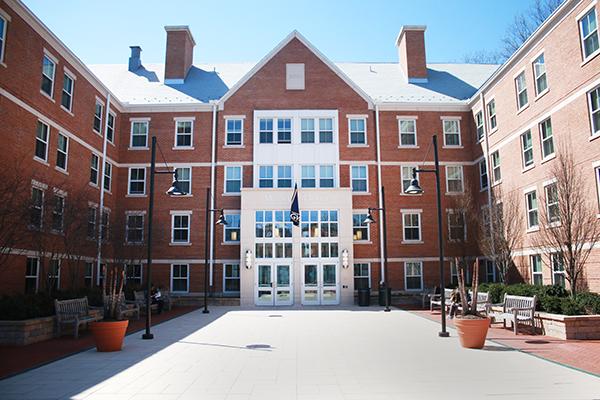
The University will continue to offer counseling services on the Mount Vernon Campus through the end of the academic year to help a community coping with three student deaths in three months, the dean of students said Saturday.
Administrators will also begin talks this summer about whether to create a permanent health center on the 600-student campus, Dean of Student Affairs Peter Konwerski said – a subject that is already at the forefront of lobbying campaigns by several new student groups.
The University Counseling Center has made services available on the campus for three hours each day this week, after the deaths of two students West Hall stirred students to call for stronger mental health support on the Foxhall Road campus.
“We are not going to spare any resource and we are fortunate to have so many on our campus,” Konwerski wrote in an email. “We have begun to ramp up our capacity to support the University Counseling Center from various academic departments across campus and we are exhausting resources from inside the University as well as externally through contract mental health providers.”
The center has found extra support from multiple areas of the University, including the psychology department, public health school and medical school. GW has also contracted outside clinicians to meet the rise in demand.
It has planned meetings with students close to the deceased, including members of organizations like the University Honors Program and the Beta Theta Pi fraternity, as well as those in the 280-student West Hall.
Two students died in West Hall this week, just three months after a freshman died there in January. Two of those deaths have been labeled suicides.
Some student leaders, including junior Ari Massefski, say its important to start conversations about whether it’s necessary to expand mental health resources to the Mount Vernon Campus.
Massefski, who was recently elected president of the Residence Hall Association, joined several students Sunday afternoon to offer support to the West Hall community by greeting students with free fruit, vegetables and granola bars outside the building’s entrance. But he said the community may need more professional support in the long-term.
“Everyone wants to find something that will get students the support that they need, we just need to see what the best way forward is,” Massefski said.
Campus mental health groups are also beginning to mobilize to secure permanent resources on the 23-acre suburban campus, said Farrah Hasnain, president of GW’s branch of the suicide prevention group To Write Love on Her Arms. She said she immediately reacted to this week’s tragedies by planning a campaign for more resources.
The group is one of several organizations pushing for stronger mental health resources.
A new organization called GW Advocates has promised to present University President Steven Knapp with a report that details current and former students’ concerns about campus resources. Another group, GW Unites, plans to create a student-based support network for the community.
A GW chapter of the National Alliance on Mental Illnesses, the country’s largest grassroots group dedicated to mental health, held its first meeting on campus last month. It plans to register with the Center for Student Engagement in the fall.
Universities that have experienced similar strings of tragedies have also taken steps to review their support systems. At the University of Pennsylvania, where four students committed suicide in two months during this academic year, officials launched an investigation into common causes of stress and the quality of the school’s mental health resources.
GW faced similar circumstances in 2004, when three students committed suicide within four months, and former University President Stephen Joel Trachtenberg charged two dozen administrators with a campuswide investigation. That group released a 55-page report on the state of GW’s mental health system, calling for increased funding, staffing and availability.
The three student deaths this year are the first ever to be reported at the Mount Vernon Campus, which is located in the wooded Foxhall neighborhood about three miles from Foggy Bottom.
The campus, which has its own library and University Police Department office, has housed about 680 students since the reopening of West Hall in 2010. Renovations to that building added a dining hall, state-of-the-art gym and a blackbox-style theater.
Dozens more classes have been held there since the opening of Ames Hall in spring 2012, with the University Honors Program and University Writing moving to the campus in full in recent years.
– Sarah Ferris contributed to this report.








